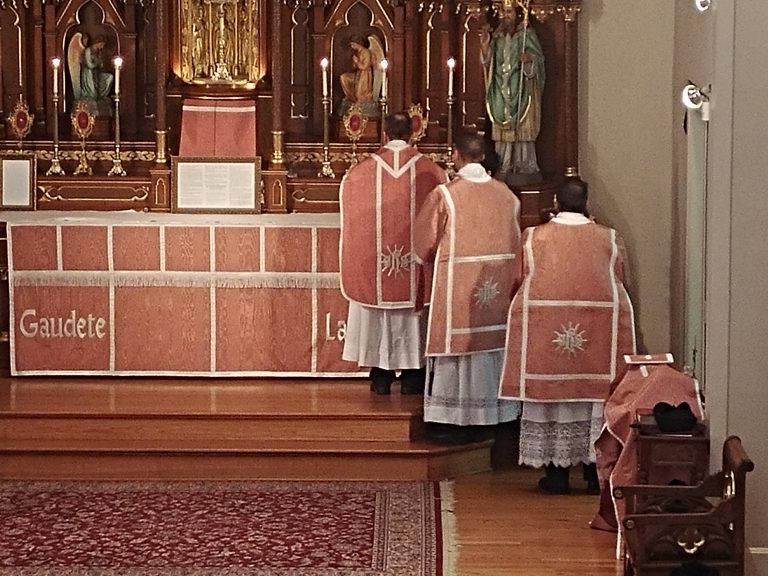 This Sunday’s nickname, “Gaudete” means “Rejoice!” Gaudete, an imperative of gaudeo and the first word of the Introit chant, sets the theme in the Novus Ordo and the older, Traditional Mass: joy.
This Sunday’s nickname, “Gaudete” means “Rejoice!” Gaudete, an imperative of gaudeo and the first word of the Introit chant, sets the theme in the Novus Ordo and the older, Traditional Mass: joy.
Advent is not strictly a penitential season the way Lent is. Since Advent is about Lord’s Second Coming, not just His joyful First at Bethlehem, we also prepare through penance, joyful penance, or maybe penitential joy. We sing Alleluia but not the Gloria. During Advent flowers and ornaments are put aside and musical instruments are not to be used, except organ to sustain congregational singing… except for today, when the discipline is relaxed. Gaudete parallels Laetare Sunday in Lent (which also means “Rejoice!”). Therefore, today is the only other Sunday we have rose (rosacea) colored vestments.
Let’s move along to our prayers.
 COLLECT (1962MR):
COLLECT (1962MR):
Aurem tuam, quaesumus, Domine, precibus nostris accommoda:
et mentis nostrae tenebras, gratia tuae visitationis illustra.
The multi-volume Corpus orationum says this prayer was, with variations, in numerous ancient manuscripts. The mickle Lewis & Short Dictionary says accommodo means “to fit or adapt one thing to another, to lay, put, or hang on”. In English “accommodations” are a place suited to our living needs. An “accommodating” person adjusts his world to suit our exigencies. In relation to property accommodo means: “to lend it to one for use”. In Classical Latin it is found, as in today’s prayer, with “ears”. Think of Marc Antony crying out in Shakespeare’s Julius Caesar (III,ii) , “Friends, Romans, countrymen, lend me your ears”. Mens means “the conscience” as well as “a plan, purpose, design, intention”. Mens points to our heart, mind and soul.
LITERAL VERSION:
O Lord, lend your ear to our prayers, we beseech you, and by the grace of your visitation, illuminate the shadows of our mind.
God is infinite. Yet it is possible for us to call on a loving God to condescend and adapt to our needs. Our prayers, which our own for our benefit, are intricately bound with God’s eternal self-knowledge, plan and providence. In the case of God “hearing” us, He knows what we want better than we know it ourselves. Consider also that the eternal Word, uttered from before time, is in our prayers and good words and deeds, echoing back to the Father. If we are images of God, especially in our mens, God should be able to hear and recognize Himself in us. Our neighbor should look at us and hear us and see God reflected.
 A second image in the prayer is from the contrast of illumination and darkness. Christ, the light to our darkness, moral and intellectual, is coming. With grace He adapts our minds and hearts to receive what is necessary for salvation. He adapts to us, in His incarnation. He adapts us to Him by grace.
A second image in the prayer is from the contrast of illumination and darkness. Christ, the light to our darkness, moral and intellectual, is coming. With grace He adapts our minds and hearts to receive what is necessary for salvation. He adapts to us, in His incarnation. He adapts us to Him by grace.
SECRET (1962MR):
Devotionis nostrae tibi, quaesumus, Domine, hostia iugiter immoletur: quae et sacri peragat instituta mysterii, et salutare tuum in nobis mirabiliter operetur.
This prayer is in the ancient Gelasian among Advent prayers and in the Veronese Sacramentary during September for the “fast of the seventh month” (Latin septem “seven”). It survived the post-Conciliar reform, and is in the Novus Ordo with potenter for the older mirabiliter.
Iugiter is an interesting adverb. A iugum is a “yoke”, which harnesses oxen to a plow. The iugum was the symbol of defeat. Romans would force the vanquished to pass underneath to symbolize that they had been subjugated. Our present iugiter means “always” or “continuously”, since by it actions are “yoked” together, one after another.
Immolo means “to sprinkle a victim with sacrificial meal” (as in grain) and also “to bring as an offering, to offer, sacrifice, immolate.” Perago means essentially, “to pass through” and is construed as “to thrust through, pierce through, transfix” and hence “to slay.” Also it means “to carry through, go through with, execute, finish, accomplish, complete.” The Latin liturgical dictionary Blaise/Dumas says perago suggests continuous action. Operor is “to work, have effect, be effectual, to be active, to operate.”
LITERAL TRANSLATION:
We now beg, O Lord, let there be offered up to You continuously the sacrificial victim of our devotion, which may both carry through the actions of the sacred mystery that was instituted, and wondrously effect for us Your salvation.
 Do not forget this, O Catholic reader. What does “wondrously effect for us Your salvation” really mean, if we do not as a consequence embody that effect, echo these words and sacred actions in our daily lives and works of mercy? The Communion Antiphon drives this home. This Sunday we hear Isaiah 35:4: “Dicite pusillanimes: confortamini et nolite timere… Say to those who are of a fearful heart, ‘Be strong, fear not! Behold, your God will come with vengeance, with the recompense of God. He will come and save you.’”
Do not forget this, O Catholic reader. What does “wondrously effect for us Your salvation” really mean, if we do not as a consequence embody that effect, echo these words and sacred actions in our daily lives and works of mercy? The Communion Antiphon drives this home. This Sunday we hear Isaiah 35:4: “Dicite pusillanimes: confortamini et nolite timere… Say to those who are of a fearful heart, ‘Be strong, fear not! Behold, your God will come with vengeance, with the recompense of God. He will come and save you.’”
This is meant not for us to hear and rejoice in, but also to hear and act upon.
We will all be called to account for how we treated the Lord’s gifts, how we shared them … or not. Will you participate and Mass and then not attend to the salvation of others? St. Basil “the Great” of Caesarea (+379), preaching about the obligation of Advent almsgiving said:
“The command is clear: the hungry person is dying now, the naked person is freezing now, the person in debt is beaten now – and you want to wait until tomorrow?”
After the Antiphon the priest intones today’s…
POSTCOMMUNIO (1962MR):
Imploramus, Domine, clementiam tuam: ut haec divina subsidia, a vitiis expiatos, ad festa ventura nos praeparent.
Again this is from the Gelasian Sacramentary. It is also in the Novus Ordo, but rearranged with a slight change to improve the rhythm: “Tuam, Domine, clementiam imploramus…”. It is also nice to start with God (Tuam) rather than with us (imploramus).
L&S indicates that clementia, is “a calm, tranquil state” and, “indulgent, forbearing conduct towards the errors and faults of others, mercy.” It is a form of address, “Clementia Tua…Your Clemency”, like “Your Majesty”. Subsidium means “the troops stationed in reserve in the third line of battle (behind the principes)” and thus “support, assistance, aid, help, protection”. A vitium is “a fault, defect, blemish” and consequently, “a moral fault, failing, error, offence, crime, vice”. Expio means “to make satisfaction, amends, atonement for a crime or a criminal; to purify any thing defiled with crime; to atone for, to expiate, purge by sacrifice.”
LITERAL TRANSLATION:
We implore Your mercy, O Lord, that these divine supports may prepare us, purified from our faults, for the coming feast days.
During Holy Mass today we anticipate the joy of Christmas with flowers, instrumental music, and rosacea vestments. At the end, however, comes a stark prayer, spare, a reminder our sins.
We hear military language (subsidia). We are soldiers engaged in spiritual warfare. In the Latin Rite, Holy Mass ends abruptly. Seconds after this the priest will literally order us to get out, to go back into the world to our work: “Ite! missa est… Go! Mass is over!”, and bless us for our tasks. There must be continuity between the reception of Communion and our daily lives.
Today’s prayers, in both the Traditional Missale Romanum and in the Novus Ordo, speak to us from our ancient Roman Catholic origins. And they continue them. Is that not what the traditionally minded Catholic desires? As a result, desire for these prayers, putting so much stock in them, demands a response according to the heart and mind of the prayers.
When these prayers were first uttered in the Roman liturgy, during Advent, Christians denied themselves in fasting in order to share more generously with the poor. St. Leo I “the Great” (+461) was Pope when these prayers were probably coming into use. Leo’s thought must help us understand what these prayers really say.
What did Leo think of Advent? Hear him now in a sermon on the Advent fast:
“What can be more salutary for us than fasting, by the practice of which we draw nearer to God, and, standing fast against the devil, defeat the vices that lead us astray. For fasting was ever the food of virtue. From abstinence there arise chaste thoughts, just decisions, salutary counsels. Through voluntary suffering the flesh dies to concupiscences, the spirit waxes strong in virtue. But as the salvation of our souls is not gained solely by fasting, let us fill up what is wanting in our fasting with almsgiving to the poor. Let us give to virtue what we take from pleasure. Let abstinence of those who fast be the dinner of the poor.”


































Catholic University of America Press has published Ossa Ostensa: A Proven System for Demystifying Latin, Book 2, by Laura Pooley.
Paperback 9781949822366
eBook 9781949822373
Thank you for this.